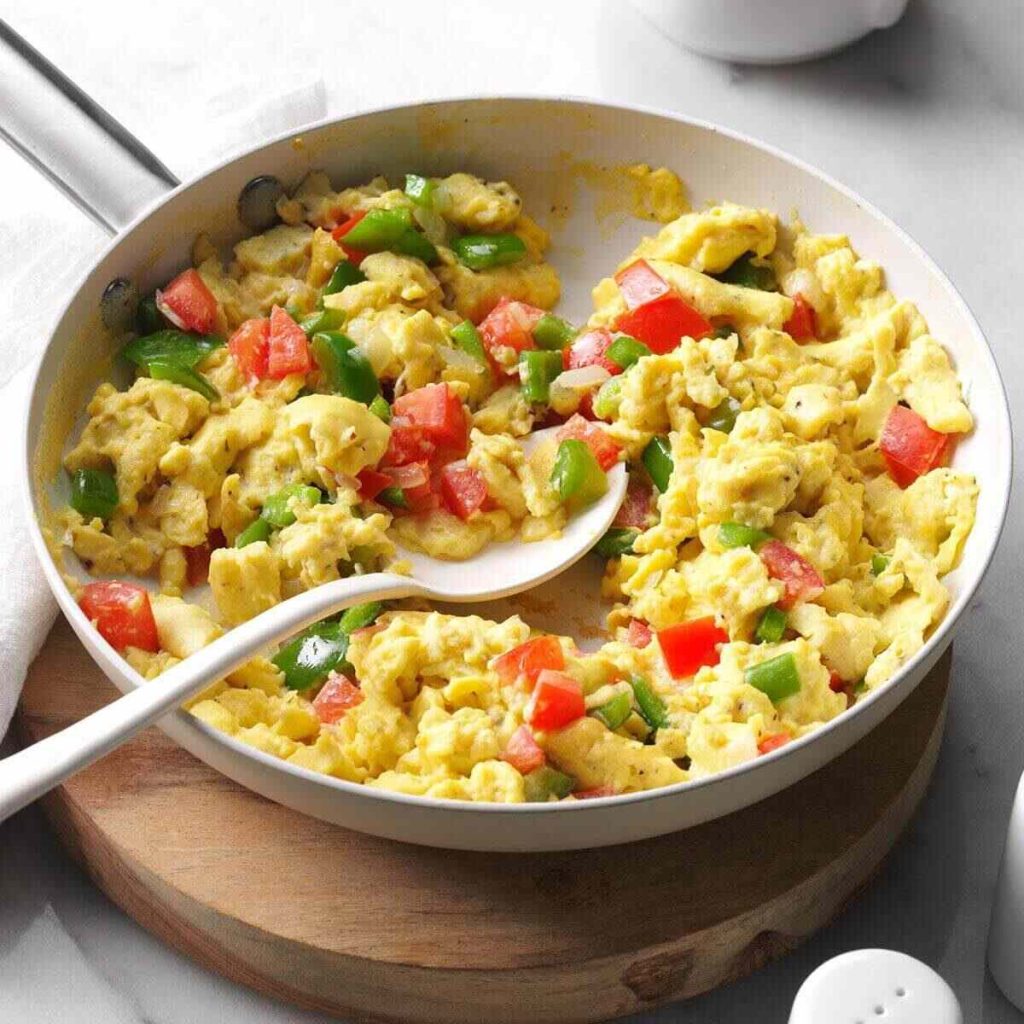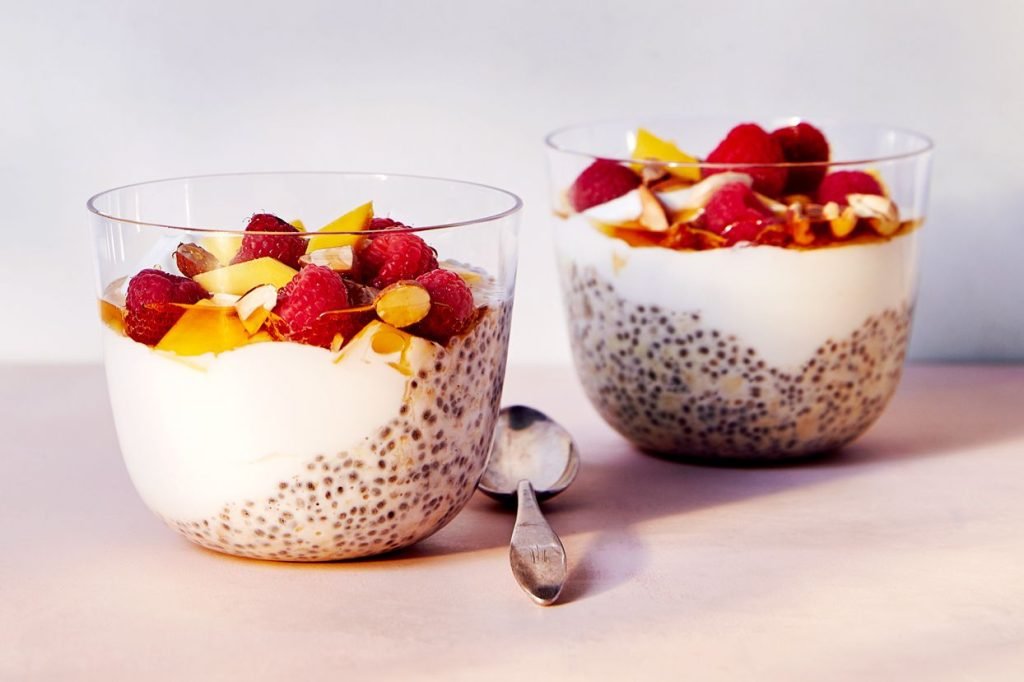Introduction:
Healthy Breakfast Ideas Without Eggs is often hailed as the most important meal of the day, and for good reason. It kick-starts your metabolism, fuels your body for the day ahead, and can set the tone for your overall health and wellness. However, if you’re looking to avoid eggs—whether due to allergies, dietary preferences, or simply a desire for variety—it can sometimes feel like your options are limited. But fear not! There are plenty of nutritious and delicious egg-free breakfast options that can satisfy your morning hunger and keep you energized.

1.Overnight Oats
Overnight oats are a versatile and convenient breakfast option that requires no cooking. Simply combine rolled oats with your choice of milk (dairy or plant-based) and let it sit in the fridge overnight. By morning, you’ll have a creamy and delicious meal ready to eat. Add your favorite toppings like fresh fruits, nuts, seeds, or a drizzle of honey to make it even more satisfying. For an extra boost of flavor, try mixing in some cinnamon, vanilla extract, or cocoa powder.
2.Smoothie Bowls
Smoothie bowls are a fun and visually appealing way to start your day with a nutrient-packed breakfast. Blend your favorite fruits, such as berries, bananas, or mangoes, with a liquid base like almond milk, coconut water, or yogurt. Pour the smoothie into a bowl and top it with granola, nuts, seeds, and fresh fruit slices. You can also add a spoonful of nut butter, chia seeds, or a sprinkle of cacao nibs for added texture and flavor.
3.Avocado Toast
Avocado toast is a trendy breakfast option that is as tasty as it is simple to prepare. Start with a slice of whole-grain bread, toast it to your desired crispness, and spread a generous layer of mashed avocado on top. For added flavor, sprinkle on some salt, pepper, red pepper flakes, or even a squeeze of lemon juice. You can also get creative with your toppings by adding sliced tomatoes, radishes, microgreens, or even a drizzle of balsamic glaze.
4.Chia Seed Pudding
Chia seed pudding is a nutritious and satisfying breakfast that you can prepare in advance. Mix chia seeds with your favorite milk, sweeten with a little honey or maple syrup, and let it sit in the fridge for a few hours or overnight. The chia seeds will absorb the liquid and create a pudding-like consistency. Top with fresh berries, coconut flakes, or chopped nuts for added texture and flavor.
5.Vegan Pancakes
Who says you need eggs to make fluffy pancakes? There are plenty of vegan pancake recipes that use ingredients like mashed bananas, applesauce, or flaxseed as egg substitutes. Combine flour, baking powder, plant-based milk, and your chosen egg replacement to create a thick batter. Cook the pancakes on a griddle until golden brown, and serve with fresh fruit, maple syrup, or a dollop of nut butter.
6.Breakfast Quinoa
Quinoa isn’t just for lunch or dinner—it can also make a hearty and protein-rich breakfast. Cook quinoa according to package instructions, and then mix it with your choice of milk, a drizzle of honey or maple syrup, and a handful of fresh or dried fruits. For added flavor, stir in some cinnamon, vanilla extract, or a spoonful of nut butter. You can also prepare a savory version by adding sautéed vegetables, herbs, and a sprinkle of nutritional yeast.
7.Fruit and Nut Breakfast Bars
Homemade breakfast bars are a great grab-and-go option for busy mornings. Combine oats, nuts, seeds, dried fruits, and a sticky sweetener like honey or maple syrup in a bowl. Press the mixture into a baking dish and bake until firm. Once cooled, cut into bars and store in an airtight container for a quick and easy breakfast throughout the week. You can customize these bars with your favorite ingredients, such as dark chocolate chips, shredded coconut, or a dash of cinnamon.
8.Yogurt Parfait
A yogurt parfait is a simple yet satisfying breakfast that you can customize to your liking. Start with a base of plain or flavored yogurt (Greek or plant-based), and layer it with granola, fresh fruits, and a drizzle of honey or agave. For an added crunch, sprinkle on some nuts or seeds. This breakfast is not only delicious but also packed with protein, probiotics, and antioxidants.
9.Sweet Potato Toast
For a creative twist on traditional toast, try using sweet potato slices as the base. Slice a sweet potato into thin rounds or lengthwise slices, and toast them in a toaster or oven until tender and slightly crispy. Top your sweet potato “toast” with avocado, nut butter, or even a spread of almond butter and sliced bananas. This nutrient-dense breakfast is a great way to get your daily dose of vitamins and minerals.
10.Coconut Rice Pudding
Rice pudding isn’t just for dessert—it can also make a comforting and filling breakfast. Cook your rice in coconut milk for a creamy and slightly sweet base. Once cooked, sweeten with a little honey or maple syrup, and stir in some vanilla extract. Top with fresh or dried fruits, a sprinkle of cinnamon, and a handful of nuts or seeds for added texture. This warm and satisfying breakfast is perfect for cooler mornings.
Conclusion
Egg-free breakfasts don’t have to be boring or repetitive. With a little creativity and some simple ingredients, you can enjoy a variety of delicious and healthy meals that will keep you energized throughout the day. Whether you prefer something sweet or savory, hot or cold, there’s an egg-free breakfast option out there that will suit your taste buds and nutritional needs. So, go ahead and try these ideas—you might just find your new favorite morning meal!
What is the best healthy breakfast?
Breakfast is often referred to as the most important meal of the day, and for good reason. It sets the tone for your day, providing the energy and nutrients needed to kick-start your metabolism, fuel your body, and keep your mind sharp. But with so many options available, it can be challenging to determine what constitutes the best healthy breakfast. The answer isn’t one-size-fits-all, as the “best” breakfast can vary depending on individual preferences, dietary needs, and lifestyle goals. However, there are key components that make a breakfast both nutritious and beneficial for most people.
1.Balanced Macronutrients: The Foundation of a Healthy Breakfast
A healthy breakfast should include a balance of macronutrients—carbohydrates, proteins, and fats. This combination ensures that you have sustained energy throughout the morning and helps keep you full until your next meal.
Carbohydrates: Choose complex carbs like whole grains (oats, whole wheat bread, or quinoa), fruits, and vegetables. These provide a steady release of energy and are rich in fiber, which aids digestion and promotes satiety.
Proteins: Protein is essential for muscle repair and growth, and it helps keep you feeling full longer. Incorporate sources like eggs, Greek yogurt, cottage cheese, tofu, or plant-based options like beans and lentils.
Fats: Healthy fats are crucial for brain function, hormone production, and overall cell health. Include sources like avocados, nuts, seeds, and olive oil in your breakfast.
2.Incorporating Fiber: The Secret to Fullness and Digestive Health
Fiber is a key component of a healthy breakfast because it aids digestion, helps regulate blood sugar levels, and keeps you feeling full. Foods high in fiber include whole grains, fruits, vegetables, nuts, and seeds. For example, a bowl of oatmeal topped with fresh berries and a sprinkle of chia seeds provides a hearty dose of fiber that can keep hunger at bay until lunchtime.
3.The Role of Hydration: Starting Your Day Right
Hydration is just as important as food in the morning. Drinking water, herbal tea, or even a small glass of freshly squeezed juice (without added sugars) can help rehydrate your body after a night’s sleep. Some people also enjoy starting their day with warm water and lemon, which is believed to aid digestion and boost metabolism.
4.Antioxidants and Vitamins: A Boost for Your Immune System
A healthy breakfast is a great opportunity to load up on vitamins, minerals, and antioxidants, which are vital for overall health and immune function. Fruits and vegetables are the best sources of these nutrients. Berries, in particular, are high in antioxidants and can be easily added to smoothies, yogurt, or oatmeal. Leafy greens like spinach or kale can also be blended into a green smoothie for an added nutrient boost.
5.Mindful Eating: Quality Over Quantity
While it’s important to focus on what you eat, how you eat is equally crucial. Eating mindfully—taking time to enjoy your food, chewing slowly, and paying attention to hunger and fullness cues—can improve digestion and prevent overeating. This approach can help you savor your breakfast and start the day with a positive mindset.
6.Top Healthy Breakfast Ideas
Overnight Oats: A mix of rolled oats, chia seeds, almond milk, and fresh fruits creates a balanced meal rich in fiber, protein, and healthy fats.
Greek Yogurt Parfait: Layer Greek yogurt with granola, nuts, and a variety of fruits for a protein-packed, antioxidant-rich breakfast.
Avocado Toast with Whole Grain Bread: Top a slice of whole-grain bread with mashed avocado, a sprinkle of seeds, and a side of fresh vegetables for a nutrient-dense, satisfying start to your day.
Smoothie Bowl: Blend your favorite fruits, a handful of spinach, a scoop of protein powder, and some nut butter. Top with granola and seeds for added texture and nutrients.
Veggie-Packed Omelette: Eggs or tofu mixed with a variety of vegetables and herbs provide a protein-rich, low-carb option that’s full of vitamins and minerals.
Conclusion
The best healthy breakfast is one that balances macronutrients, is rich in fiber, and includes a variety of vitamins, minerals, and antioxidants. It should be tailored to your personal preferences and dietary needs, ensuring that it provides the energy and nutrients necessary to start your day on the right foot. Whether you prefer a hearty bowl of oatmeal, a refreshing smoothie bowl, or a savory avocado toast, the key is to choose foods that nourish your body and keep you feeling satisfied until your next meal. Indulge in creamy caramelized custard: a smooth dessert with a rich caramel layer and velvety custard beneath. Perfectly sweet!
What is a heart-healthy breakfast?
Healthy Breakfast Ideas Without Eggs is one that supports cardiovascular health by including foods rich in nutrients that can help lower cholesterol, reduce blood pressure, and maintain a healthy weight. It’s not just about avoiding unhealthy foods—it’s about actively choosing ingredients that are beneficial for your heart. Incorporating the right balance of fiber, healthy fats, lean proteins, and antioxidants into your morning routine can make a significant difference in your overall heart health.
1.Whole Grains: The Power of Fiber
Whole grains are a cornerstone of a heart-healthy diet because they are high in dietary fiber, which can help reduce bad cholesterol levels (LDL) and lower the risk of heart disease. Oats, whole wheat, barley, and quinoa are excellent choices. For breakfast, consider starting your day with a bowl of oatmeal topped with fruits, nuts, or seeds. Whole grain toast or a whole grain cereal with minimal added sugars can also be a great way to begin the day.
2.Healthy Fats: Supporting Good Cholesterol
Not all fats are created equal, and healthy fats play a crucial role in maintaining heart health. Monounsaturated and polyunsaturated fats, found in foods like avocados, nuts, seeds, and olive oil, can help reduce harmful cholesterol levels and support good cholesterol (HDL). Incorporating these fats into your breakfast could be as simple as adding avocado slices to whole grain toast, sprinkling nuts over your oatmeal, or drizzling olive oil over a breakfast salad.
3.Fruits and Vegetables: Antioxidant-Rich Choices
Fruits and vegetables are rich in antioxidants, vitamins, and minerals, all of which contribute to heart health by reducing inflammation and oxidative stress. Berries, citrus fruits, leafy greens, and tomatoes are particularly beneficial. For breakfast, consider a smoothie made with a variety of fruits and a handful of spinach or kale, or a side of sliced fruit with your meal. Adding vegetables like spinach, tomatoes, and bell peppers to an omelet or breakfast wrap is another heart-healthy option.
4.Lean Proteins: Essential for Heart Health
Including lean proteins in your breakfast can help you feel full longer and maintain muscle mass while supporting heart health. Opt for sources like eggs, low-fat yogurt, tofu, or lean cuts of poultry. Plant-based proteins, such as beans, lentils, and legumes, are also excellent choices as they are low in saturated fats and high in fiber. A heart-healthy breakfast might include a veggie and egg white scramble, Greek yogurt with fresh fruit and nuts, or a tofu and vegetable stir-fry.
5.Nuts and Seeds: Nutrient-Dense Additions
Nuts and seeds are small but mighty when it comes to heart health. They are packed with healthy fats, protein, fiber, and essential nutrients like magnesium and potassium. Studies have shown that regular consumption of nuts and seeds can lower cholesterol levels and reduce the risk of heart disease. Sprinkle a handful of almonds, walnuts, chia seeds, or flaxseeds onto your yogurt, oatmeal, or smoothie for an easy nutrient boost. Make a refreshing Falooda: mix milk, rose syrup, vermicelli, basil seeds, and top with ice cream and nuts. Enjoy!
6.Low-Fat Dairy: A Heart-Healthy Choice
If you include dairy in your diet, opting for low-fat or fat-free options can help maintain heart health by reducing saturated fat intake. Low-fat milk, yogurt, and cheese are good sources of calcium and protein without the added risks associated with higher-fat dairy products. For a heart-healthy breakfast, try a serving of low-fat Greek yogurt topped with berries and a sprinkle of nuts or enjoy a slice of whole-grain toast with low-fat cheese.
7.Limiting Added Sugars and Sodium: Key for Heart Health
While choosing heart-healthy foods is important, it’s equally crucial to limit added sugars and sodium in your breakfast. High sugar intake can lead to weight gain and increased blood pressure, while excess sodium is linked to hypertension. Avoid sugary cereals, pastries, and processed breakfast meats, opting instead for naturally sweet options like fresh fruit or whole grain cereals with minimal added sugars. For flavor, use herbs, spices, and natural seasonings rather than salt.
Heart-Healthy Breakfast Ideas
Oatmeal with Berries and Nuts: Start your day with a bowl of whole-grain oats topped with fresh berries and a handful of nuts for a fiber-rich, antioxidant-packed breakfast.
Avocado and Tomato on Whole Grain Toast: This simple combination provides heart-healthy fats, fiber, and essential nutrients like potassium and vitamins.
Greek Yogurt Parfait: Layer low-fat Greek yogurt with fresh fruits, seeds, and a drizzle of honey for a protein-rich, low-sugar breakfast.
Veggie Omelet with Whole Grain Toast: Use egg whites or a mix of whole eggs and egg whites, and fill the omelet with spinach, tomatoes, and bell peppers. Serve with a slice of whole grain toast.
Smoothie with Leafy Greens and Flaxseeds: Blend together a mix of fruits, a handful of spinach or kale, a spoonful of flaxseeds, and your choice of low-fat dairy or plant-based milk.
Conclusion
Healthy Breakfast Ideas Without Eggs is all about choosing foods that nourish your body and protect your cardiovascular system. By focusing on whole grains, healthy fats, lean proteins, fruits, and vegetables, and by limiting added sugars and sodium, you can create a breakfast that not only tastes great but also supports long-term heart health. Whether you enjoy a hearty bowl of oatmeal, a colorful smoothie, or a savory avocado toast, the key is to choose ingredients that contribute to a balanced and nutritious start to your day.
As an Amazon Associate, We earn from qualifying purchases. When you purchase a product through Amazon links on kitchenadvising.com, we may earn a small commission at no extra cost to you. This helps support the site and keep our content free.


